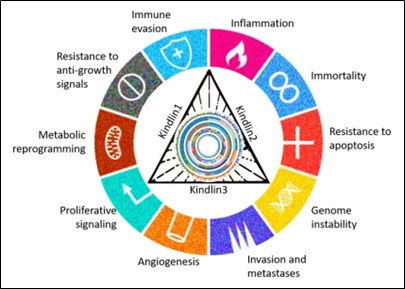PREVIOUS
Kindlins - Adapter Proteins
August 10 , 2024
496 days
553
0
- Kindlins are the adapter proteins that exist inside the cells attached to the cell membranes of almost all types of cells in vertebrates.
- This protein is central to many signalling pathways, targeting it could lead to new cancer treatments that address multiple aspects of the disease at once.
- Kindlins may undergo mutations under the influence of innumerable chemical and physical carcinogens like nicotine, ultraviolet rays and many more.
- Mutated Kindlin can potentially disrupt global mechanical homeostasis within cells.
- Therefore, understanding the consequences of genetic alterations in Kindlins holds the key to unravelling the intricate mechanisms leading to the growth of cancer cells.

Leave a Reply
Your Comment is awaiting moderation.


